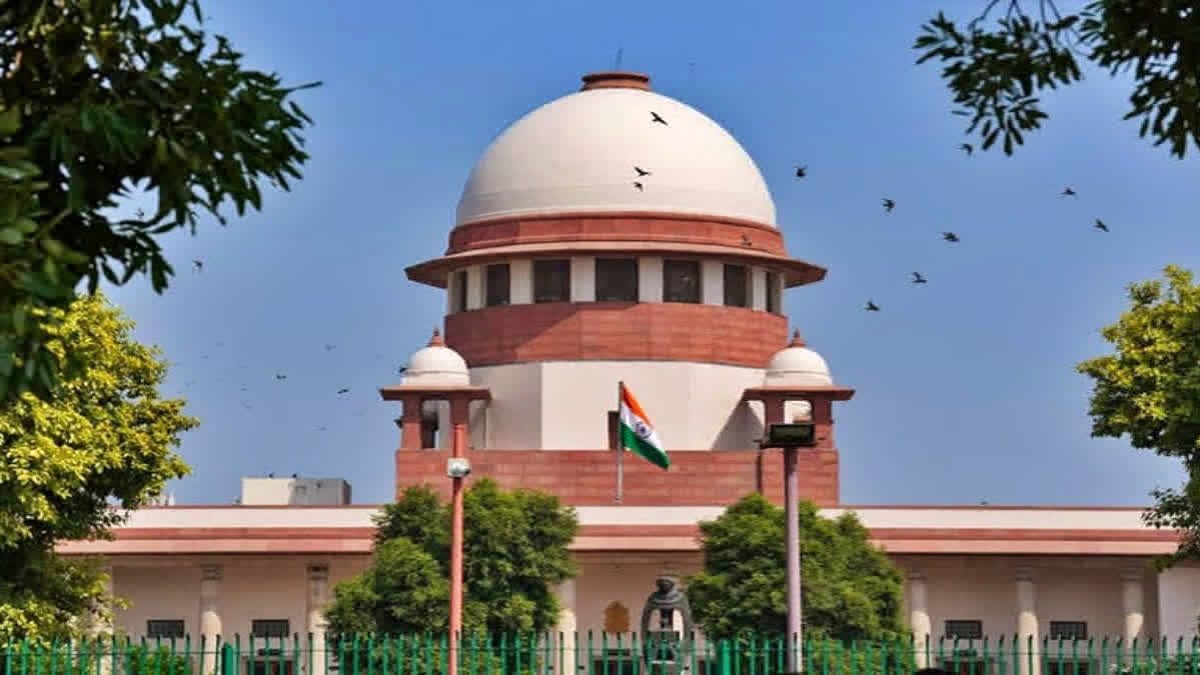New Delhi: The Supreme Court on Thursday observed that the electoral bonds scheme has an advantage over Know Your Customer (KYC) and the scheme has brought one change whatever is contributed through electoral bonds in the form of accounted transactions is within the normal banking channels. A bench led by Chief Justice of India DY Chandrachud and comprising justices Sanjiv Khanna, BR Gavai, JB Pardiwala and Manoj Misra, is hearing a clutch of petitions challenging the validity of the Centre's electoral bonds scheme as a source of political funding.
The Chief Justice observed that the government being unable to dry up all cash sources of funding of political parties is not an answer or not a ground to challenge the validity of the electoral bonds scheme. Advocate Prashant Bhushan, in rejoinder submissions, argued the scheme promotes corruption, and it legalises corruption because it allows any company to anonymously give kickbacks to parties in power. Bhushan said there is considerable evidence to show almost all electoral bonds have gone to the ruling parties, in the Centre and states, and 94% of electoral bonds purchased are in the denomination of Rs 1 crore and the rest are in Rs 10 lakhs.
Bhushan said the government says there is a right to privacy and this right does not extend to companies it is an individual right, and amendments made to the Income Tax Act and the Companies Act anonymise donations from companies to political parties and remove the requirement to whom one has donated and stressed that privacy right cannot be invoked for companies.
Bhushan questioned, can those individuals (who made donations through the scheme) claim a right to privacy, which overrides the right to information of citizens? Bhushan stressed that citizens have the right to know, who is funding the political party and the government would come to know (who made a donation to a political party) if it exerts pressure on the State Bank of India.
Against the backdrop of upcoming assembly polls, Bhushan expressed worry that the window for the electoral bond scheme will open any day now. He also cited the collection of money till March 2022 through the electoral bonds--the bonds were purchased over Rs 9,000 crore and under Rs 10,000 crore--and further added that the estimated total collection through bonds would be close to RS 13,000 crore.
“Requesting your lordships, even if the court does not stay the issue of electoral bonds after today, at least one thing lordship should say (to parties) that these may be subject to disclosure, the court has the power to seek information from SBI," said Bhushan.
Also read: SC asks ECI to submit data on donations to political parties till September 30
Justice Khanna asked Bhushan, "What exactly is your prayer? Are you asking for quashing (of the electoral bond scheme) or do you want disclosure should be made? The scheme has one advantage: There is a KYC at least and you will accept that”. Bhushan said that is alright, if the anonymity is removed, I have no problem, and stressed, “Remove the anonymity I have no problem with electoral bonds”.
Bhushan stressed that cash donations have not been choked so far. The Chief Justice said that is not the object at all and cited the former finance minister’s statement that it is about having some element of transparency. The Chief Justice said Arun Jaitley had said it would enhance transparency to a significant extent and the earlier regime was purely cash-based – voluntary contributions and electoral trusts – and cash-based scheme proceeds on anonymity and according to you, they have continued anonymity.
“But there is one change that the electoral bonds have brought whatever is contributed through electoral bonds in the form of accounted transactions within the normal banking channels…," the Chief Justice told Bhushan. The Chief Justice said whether the electoral bonds scheme reduces black money or not, to my mind, is irrelevant to the validity of the scheme, and the scheme may be wholly unsuccessful but it may be a wholly valid scheme.
Bhushan said one can still give cash, and there is no bar made on cash. The Chief Justice asked, how do you impose a bar on cash? It is a third economy and not only would that be illegal, but also this is a third economy. Bhushan stressed that even the RBI, when it dealt with the bonds, said that if your object is to make political funding go through banking channels - there are existing instruments of cheques, drafts etc and questioned why are you introducing an anonymous channel.
During the hearing, Solicitor General Tushar Mehta, representing the Centre, made it clear that investigative agencies can only access details of donors pursuant to a court order and the purpose is not that the party in power knows who paid whom, and no one can argue that there has to be a level playing field. Mehta pointed out that electoral bonds are valid only for 15 days, which acts as a check to ensure that it does not become a currency or a bearer bond that can be traded.
He added that this reduces the possibility of kickbacks. Responding to Justice Khanna’s query on how the scheme does not encourage a level-playing field for political parties, Mehta said the average Indian voter, be it corporate or an illiterate voter- is a very intelligent decision maker and secrecy per se is not antithetical to free and fair elections.
Mehta said if there is a genuine public interest in the disclosure, one can go to court, but merely for curiosity, you cannot invade someone’s privacy. Attorney General R Venkataramani submitted that the scheme treats all contributors equally and that the confidentiality of contributors is important. He emphasised that moving away from black money to a regulated scheme serves the public interest. After hearing submissions for three days the bench reserved the judgment.



